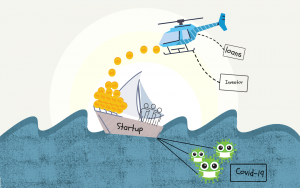Startup Ecosystem’s Resilience vs Covid-19

The Covid shock of March of 2020 devastated most industries and the startup ecosystem was no exception. Sequoia Capital – the american capital venture firm; issued its now-famous memo calling ‘Coronavirus the Black Swan of 2020’ and Nasscom said 40% of Indian tech startups were forced to halt operations. But investments and startups have shown resilience and recovered, as India saw a rapid shift to digital services and payments.
As per a survey report by Innoven Capital (survey of 140 founders); leading factors that make India appealing as a startup nation are-
- Cost of doing business
- Proximity to customers/vendors
- Size of the domestic market
India’s startup ecosystem has grown multifold in the last few years, with an almost tenfold increase from 4,200 startups in 2015 to 40,000 in November 2020. India has the 2rd largest startup ecosystem in the world; expected to witness YoY growth of 10-12%. Presently, over 7 million college graduates per year i.e. 55% of the youth prefer working in startups over corporates (as per a youth of the nation survey of 150K young Indians). And the pandemic hit the world and made employment in our country a very tough row to hoe, where the median age of founders averages at about 31. The pandemic had a greater impact on some industries, including travel and hospitality, while others, such as health technology and education technology, experienced a major growth. One of the biggest concerns for small firms was a lack of financial flow and the possibility of closing down operations as a result of the pandemic.
Several regulatory reforms were begun to adapt to the new COVID-19 reality, while stakeholders in the startup ecosystem got together through Startup India to support one another. These measures sought to help businesses stay afloat and make conducting business easier. The ecosystem’s resilience was also demonstrated by Startup India’s many webinars on handling crisis response during this time period, which attracted over 10,000 views. In addition, open contacts with industry leaders were set up to bridge the knowledge gap between various stakeholders. We’ve started holding virtual pitches and mentorship sessions at CAN to support the community make the transition from offline to fully online mode. Dedicated efforts like these have borne fruits months after they were efficiently and urgently convened.
According to NASSCOM, education, healthcare, and other digital technology industries have begun to show incredible growth.This comeback was mirrored in investments, which totaled $14.90 billion in the July-September 2020 period, up from $4.94 billion in the same quarter last year.Sources claim that if all actors in the startup ecosystem work together, India would not only overcome COVID-19’s negative consequences, but also have 100 unicorn enterprises by 2025.






